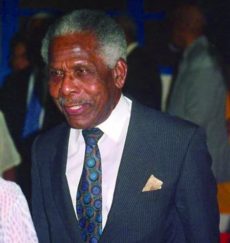
The staff and trustees of Humanists UK were saddened to learn of the death of Sir Kenneth Stuart, the distinguished medical doctor and patron of Humanists UK for many years. He died on 11 November, aged 97. A Barbadian academic of global renown, Sir Kenneth led a life dedicated to promoting advances in human health and human rights. He will be deeply missed.
Sir Kenneth began his academic life at the prestigious Harrison College in Barbados, before going on to receive his M.D. from Queen’s University, Belfast, later becoming an inaugural faculty member of the University Hospital of the West Indies in 1952. A scientist as much as a healer, Sir Kenneth was driven to make ever greater contributions to the world of medicine, and over a very long career received distinguished appointments and positions at such institutions as University Hospital, Jamaica, St. George’s, University of London, and the London School of Hygiene & Tropical Medicine. He also served both as scientific advisor to the Commonwealth Secretariat in London, consultant advisor to the Wellcome Trust, and as patron of Doctors for Human Rights.
For all the heights of his professional career, Sir Kenneth’s work was underpinned by one simple humanist conviction: that ethical problems and scientific questions were best solved through the application of rational thinking and kindness. Medicine, for Sir Kenneth, represented more than his life’s pursuit and his passion. It was a crucial frontline in the struggle for a fairer, more rational world. He saw medicine, as alike no other field, as a space where scientific progress and traditional attitudes to morality could bring people into sharp conflict, as it does today on issues like the right to die. The resolution of these disputes was more than just an intellectual matter; putting rational and human-centric thinking into practice, men and women everywhere were empowered to save and improve lives all around the world. He was an early advocate for a British ethical council that could respond appropriately to medical-ethical crises in the health service, which could expand the influence of ethical experts who were not doctors, scientists, or lawyers. He told the Independent newspaper in 1966 that:
It is time that society gave more attention to the processes (other than the current ‘fire alarm’ approaches) by which such questions might be dealt with in the future. There is clearly a need for some form of National Ethical Council with a wide-ranging membership, whose role would not only be to review the issues that stemmed or seemed likely to stem from medical scientific advance but also to promote community understanding and discussion of them.
It was this humanist approach to life – bringing together independent thinking with a desire to act in the best interests of everybody – which brought him into the fold of several human rights groups, including Humanists UK, which appointed Sir Kenneth its patron in recognition of his work. He worked alongside Humanists UK on a number of issues, and was among a number of eminent humanist scientists who urged the Government to add evolution be added to the primary school curriculum in England in the late 2000s. He also joined several of his fellow Humanists UK patrons in writing to Prime Minister Tony Blair in 2003 asking for greater recognition of Darwin Day as a national holiday in the United Kingdom.
Humanists UK Chief Executive Andrew Copson reacted to Sir Kenneth’s death, saying:
Sir Kenneth was another brilliant example of a humanist whose life was dedicated to making the world a better place, putting his considerable talents to work advancing the field of medicine on both sides of the Atlantic. His contributions to humanism in Britain were just as significant, and will be remembered just as fondly. As they reflect on his life and his achievements in the coming days and weeks, Sir Kenneth’s family can be proud of all that he did to champion ideas for a better society. All my thoughts are with them at this time.
Notes
At Humanists UK, we want a tolerant world where rational thinking and kindness prevail. Our work helps people be happier and more fulfilled, and by bringing non-religious people together we help them develop their own views and an understanding of the world around them.
Humanists UK has over 170 patrons who support its work in various ways through their expertise and prominence in various fields. Existing patrons include significant figures from the spheres of science, philosophy, human rights activism, politics, the arts, and broadcasting. The President of Humanists UK is the writer and comedian Shappi Khorsandi, who is supported by Vice Presidents Professor Jim Al-Khalili, Professor A C Grayling, and Polly Toynbee. For a full list of patrons, see https://humanists.uk/about/our-people/patrons.
